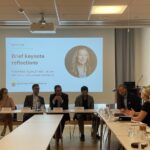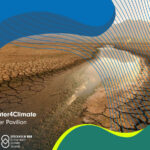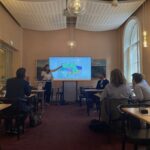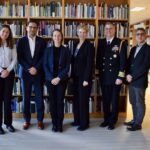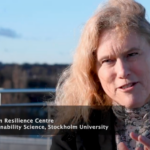On December 14, 2022, the Stockholm Hub on Environment, Climate, and Security organized a “research get to know” meeting at Stockholm International Peace Research Institute (SIPRI) for Hub partners to share current research and generate new insights and ideas within the Hub’s research areas: biodiversity, just resilience, climate security and climate institutions, and information influence campaigns. The interdisciplinary setup of the Hub provides a unique opportunity to explore the ways in which climate and environmental change lead to human insecurities and undermine sustainable, just, resilient, and peaceful societies.
The just resilience research area focuses on the importance of a just transition for climate change adaptation. The Hub has proposed a framework for a just transition for adaptation, focused on two dimensions: justice (procedural and distributional) and connectedness. Achieving global just resilience requires addressing both dimensions together. Stockholm Environment Institute (SEI) presented research on “connectedness” as a determinant of just resilience in the transboundary minerals-energy-food complex, while Stockholm Resilience Centre (SRC) discussed drivers, impacts, and solutions to the current food crisis.
Fragile and conflict-affected states are highly vulnerable to the effects of climate change. SIPRI and SEI presented research on climate-related security risks and the link between financed climate adaptation and the reduction in conflict risks. Climate finance, for both adaptation and mitigation, can help build resilience and prepare countries to cope with the effects of climate change. It can also enable co-benefits, such as reducing tensions over natural resources and positively contributing to peace.
Biodiversity plays a key role in underpinning biosphere resilience. Resilience is the capacity of a natural system to cope and adapt in the face of changing social or environmental conditions. The loss of biodiversity and resilience can very often lead to tipping points being crossed and sudden, catastrophic and almost irreversible changes occurring. SRC presented its current research on the underexplored relationship between biodiversity loss and conflict.
The impact of disinformation on climate negotiations and climate adaptation has significant security implications. Organized disinformation campaigns and different actors’ political and security needs and interests have skewed the climate change narrative, leading to polarization and eroding trust in climate science. Stockholm International Water Institute (SIWI) presented work on information manipulation and its consequences on climate and water security.
The seminar offered a valuable opportunity for researchers to share research and generate new insights and ideas within the Hub’s research areas. The research highlighted the importance of global collaboration and cooperation in addressing the challenges posed by climate change and its impacts on human security.
Read the Hub’s ”An Agenda on Environment, Climate and Security” for more information on the research areas covered in the seminar.

